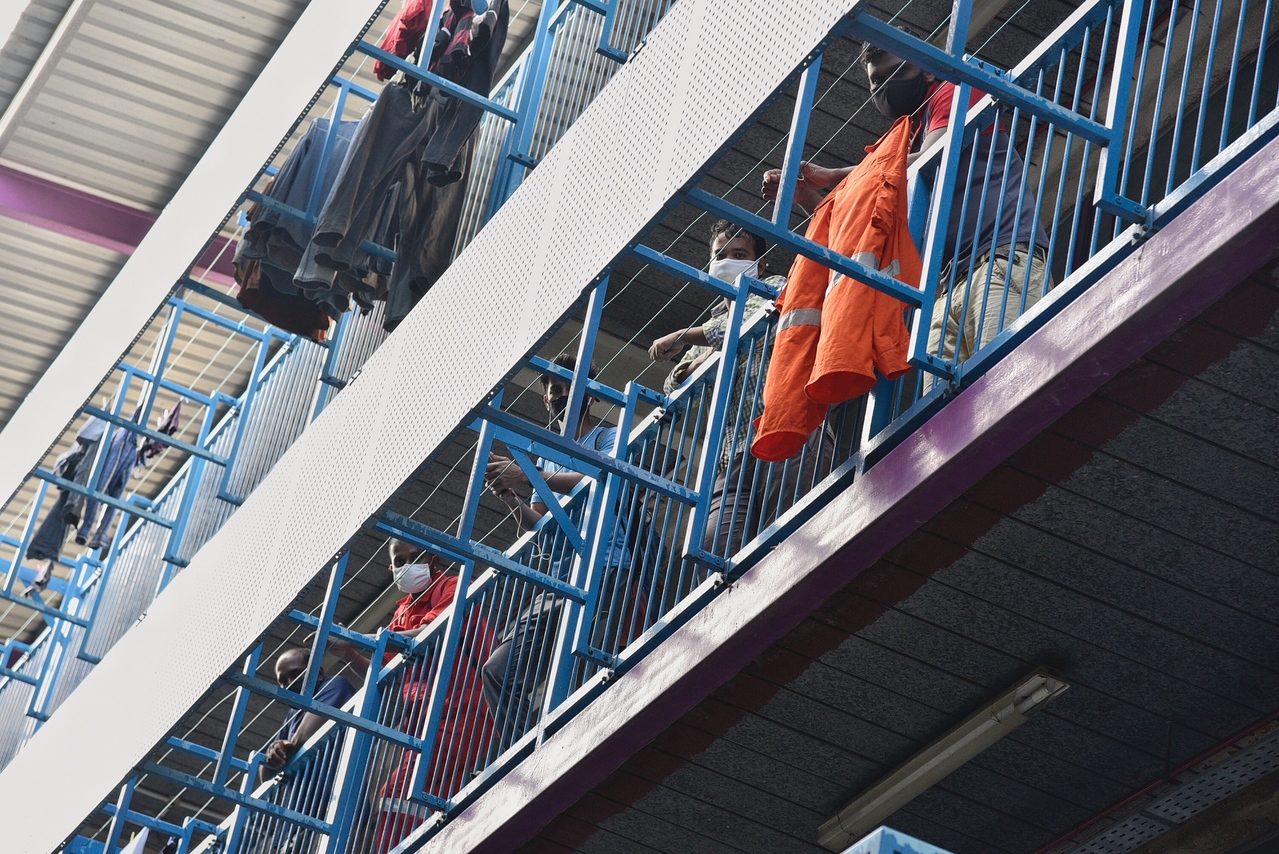Migrant workers under lockdown in S'pore had higher symptoms of depression and stress: Yale-NUS study
Sign up now: Get ST's newsletters delivered to your inbox

The study involved surveys of 1,011 migrant workers employed in manual labour positions in Singapore between June and October 2020.
PHOTO: ST FILE
SINGAPORE - A new study has found that migrant workers here displayed increased symptoms of depression and stress while they were placed under movement curbs last year.
This was especially the case with workers who were confined to only the dormitories or their rooms compared with those who were allowed to access their dormitories, worksites and designated recreation centres.
"This suggests that while isolation of whole facilities may be expedient for limiting Covid-19 transmission, this comes at the cost of increased mental health burden," said the team of researchers led by Assistant Professor Jean Liu, who teaches psychology at Yale-NUS' Social Sciences Division.
Their report was published in the Journal Of Migration And Health on Aug 19.
The Government had gazetted two dormitories here as isolation areas on April 5 last year, with about 20,000 migrant workers quarantined in their rooms to curb the spread of Covid-19.
On April 21, all migrant workers in dormitories were put under lockdown and not allowed to leave. At the time, 7,266 had tested positive for the virus.
As at Thursday (Aug 26), a total of 54,815 workers have tested positive for the virus.
Even after the majority of the dormitories were declared cleared in August 2020, workers still had some of their movements and activities restricted.
They are still largely confined to the areas where their dormitories or worksites are located, and can go only to designated recreation centres on rest days.
The study involved surveys of 1,011 migrant workers employed in manual labour positions in Singapore between June and October 2020.
Prof Liu told The Straits Times on Friday that her team was motivated to carry out the study after hearing about the need for mental health support among the migrant worker community last year, as well as reports of suicide attempts in the dormitories.
She said: "This was a project very close to our heart... Amid the uncertainties in those early days, we wanted to make sure migrant workers' mental health needs were cared for."
The surveys were administered by a multilingual and multicultural research team in the participants' native languages, and were available in both written text and audio recordings to ensure access regardless of literacy level.
The workers were given either online or physical questionnaires and had their symptoms measured using the 21-item Depression, Anxiety and Stress Scale.
The researchers said the scale is widely used to screen for depression, anxiety, and stress symptoms, and has been used during the pandemic to capture mental health across countries and population segments.
Workers who were completely confined to the dormitories or their rooms reported a median score of 8 for stress and 6 for symptoms of depression.
This was higher than those under minimal restrictions, who were allowed to move within their dormitories, worksites and designated recreation centres.
They reported a median score of 2 for stress and 2 for depression.
Workers who were fearful about their health during the pandemic had median scores of 6 for depression, 4 for anxiety, and 8 for stress.
This was higher than those who were not fearful, who reported median scores of 2 for depression, zero for anxiety and 2 for stress.
Those who feared losing their job during the pandemic also reported higher levels of such symptoms than those who did not.
Those who were more exposed to rumours about Covid-19 also had higher levels of depression, anxiety and stress symptoms than those who had a lower exposure.
Prof Liu said that similar findings have been reported in other studies around the world.
"On the one hand, this may be because people share more rumours when they're anxious. Alternatively, rumours are often associated with uncertainties, which can in turn fuel more anxiety," she explained.
The researchers did not find evidence that migrant workers had a higher rate of mental health symptoms than the general population.
Prof Liu said: "As a group, migrant workers are incredibly resilient. At the same time, it's important that we talk about those who were struggling - workers confined strictly to their dorms, afraid of losing their jobs, afraid about their health, or diagnosed with Covid-19."
She added that these are risk factors that can be modified.
"Even though migrant workers as a group did not show higher rates of mental health symptoms, those who struggled are likely to face more stressors and have less access to mental health support than the broader population."
The researchers proposed that other containment strategies should be prioritised, such as frequent swab tests and contact tracing.
"In the longer run, efforts can also be taken to reduce the density of migrant workers' work and living environments," added the researchers.
They added that there is a need for future studies to monitor participants' symptoms of mental health issues over the long term, as this will allow them to see the impact of changing movement restrictions over time.
Prof Liu said: "Support for well-being within the migrant worker community is not merely psychological - that is, the solution is not only to provide counsellors, although that is important.
"Instead, as a society we need to explore ways to promote job security, ensure healthcare access, and ensure timely access to official updates."


